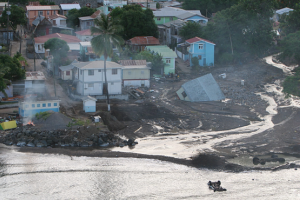Dominica’s prime minister has pleaded for more international aid to help rebuild the tiny Caribbean country after tropical storm Erika tore across the island, devastating villages, wrecking bridges and leaving a reconstruction bill worth half the country’s annual GDP.
About 10 inches of rain fell in a few hours, turning rivers on this mountainous island into torrents and hillsides into deadly mudslides. The capital Roseau was engulfed by water, and the island’s main airport is still out of action and will cost some £10m ($15m) to repair.
“Every piece of equipment at the airport has been destroyed beyond use,” said Skerrit in a statement on his Facebook page.
At least 31 people are thought to have died in the storm, but dozens more are missing and bodies are believed to remain buried under landslides.
Dominica’s neighbours in the Caribbean were the first to deliver aid in the form of helicopters, medical assistance, telecommunication engineers, and financial aid, and were followed by essential supplies and manpower from Venezuela and doctors and nurses from Cuba.
But eight days after the storm made landfall, the absence of humanitarian assistance and financial pledges from richer countries is clear and, following the arrival of Royal Navy auxiliary ship Lyme Bay, Skerrit made a fresh call for international help.
“We are hopeful that with the involvement of the British military, other developed countries will also come on board as there is plenty, plenty, plenty to be done. This country honestly does not have the resources to rebuild by itself,” he said.
British engineers are on the ground assisting with temporary water systems in villages that are without supplies, but the country faces an enormous challenge: initial estimates from the government of Dominica put the infrastructure repair and reconstruction bill at over £150m ($228m) – nearly half the country’s GDP.

The figure excludes the rebuilding of more than 370 private houses and the Jungle Bay holiday resort which was buried beneath a landslide after tourists were evacuated.
Many islanders are still in shock and fear. It is still the North Atlantic hurricane season and any repeat of this tragedy would certainly deal the island a killer blow. Heavily reliant on a fragile eco-tourism industry and frequently confused with the Dominican Republic, Dominica already endures a precarious existence.
“I can’t express how I feel,” said hotel owner Fae Martin. “Shocked, depressed, at a complete loss for words. I’ve never seen anything like this. Ever.”
Six hundred people were evacuated by sea from the south coast village of Petite Savanne after it was engulfed by mudslides.
Richard Baron described his family’s narrow escape as successive landslides entombed his home, trapping his wife and daughter inside, but sweeping him and his son down the hillside. With his leg broken, Baron held on to a tree, pulled his son out of a ravine, and then climbed back up the slide to rescue the rest of his family.
“The whole area was coming down,” he recalled. “I thought it was the end.”
More such stories will inevitably emerge as the areas that bore the brunt of the damage are recovered.

The village of Delices in the south-east is still cut off due to landslides, road and bridge destruction, as is Dominica’s highest village, Laudat, gateway to the Morne Trois Pitons National Park, a Unesco World Heritage Site and home to many of the island’s acclaimed hiking trails.
Helicopters buzz across the elevated interior throughout the day bringing essential supplies to people who have been running short of food and clean drinking water, and islanders have been volunteering with clean-up work and aid distribution. Dominicans have noticeably been at the forefront of their own recovery. Heavy machinery crews have been working 24/7, utilities teams have been crossing rivers and hiking mountains in attempts to reconnect people, and villagers have, in the main, resisted waiting for others to clear away the debris and have instead been working hard trying to bring a sense of normality to their doorsteps.
But questions are being asked about how such a tragedy ever came to pass.
Dominica was inadequately prepared for a storm such as Erika. Many roads and bridges were simply not robust enough to withstand such high volumes of water, and some will continue to ask why the airport was ever constructed in the path of the natural course of the Melville Hall river.
Bertrand Jno Baptiste, a forestry officer from the west coast village of Coulibistrie said he was still looking for help to dig out his house. “The whole village is wrecked,” he said. “It will never be the same again.”


